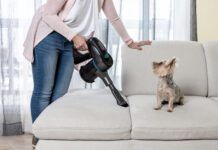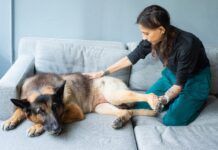[Updated August 16, 2017]
Spot-on flea products are advertised in every sort of media available to animal guardians and veterinarians, and are touted as safe and effective. However, as we discussed in February 2002, the safety record of these products is not as spotless as the manufacturers would make us believe. After all, they contain pesticides, which are poisons, and they also contain toxic ingredients that are not disclosed to consumers – or even veterinarians – without applying through the Freedom of Information Act.
The danger presented by these products becomes apparent in the hundreds of incident reports that sit in the Environmental Protection Agency’s files – not to mention the manufacturer’s own animal laboratory studies. These logs indicate hundreds of deaths and illnesses of cats and dogs who have been treated with these products by their guardians and veterinarians.

Veterinarians have even reported their own systemic reactions to the products.
In spite of this documentation, some of the manufacturers continue to claim that their products cause no internal or external health effects to animals or people. They even go so far as to assert that the products are not absorbed into the skin of the animal or human; this is not true, according to studies by the Environmental Protection Agency (see “Are Spot-On Flea Killers Safe?“).
You Have Safe Flea Removal Options
Fortunately, we have safe alternatives – effective, nontoxic methods to keep our companion animals and households free from fleas and their irritating and sometimes debilitating impacts. The safest and most effective way to eliminate fleas utilizes an approach called “integrated pest manage-ment” (IPM).
IPM is an ecosystem-based strategy that focuses on long-term prevention of pests. Pest control materials are selected and applied in a manner that minimizes risks to human and animal health, beneficial and nontarget organisms, and the environment.
The first step in any IPM program is to learn everything we can about the target, in this case, the flea. Who is the flea, and what are his habits? With this knowledge, we can implement an effective, nontoxic approach – and the knowledge that everyone in our household and surrounding environment is safe from the ravages of pesticides.
All There is to Know About Fleas
Ctenocephalides felix, the “cat flea,” is what we find in greatest numbers on our dogs and in our homes; they represent 85 to 95 percent of all household fleas found in North America. But Pulex irritans, the “human flea,” and Ctenocephalides canis, the “dog flea,” can also be found. Their bites can cause varying degrees of problems in our dogs, including an allergic skin reaction known as “flea allergy dermatitis,” tapeworm, and in severe cases, even anemia. Some dogs may host a small population of fleas for years without exhibiting problems; others may suffer a single flea bite that triggers a major allergic reaction. In most homes, it is often the dog’s scratching and chewing himself that leads his guardians into some form of flea control.
The flea progresses through four life stages: egg, larva, pupa, and adult. The time span, choice of place to inhabit, and climate conditions are relevant to each stage of development.
The average life span of a flea is about six weeks, but under certain conditions they can live as long as a year. While in the adult stage, the flea lives on our dog’s skin, and even lays its eggs there. However, the eggs laid by the females (up to 200-600 eggs in her lifetime) fall off and hatch in the environment, not on the animal.
When these eggs hatch, the emerging larvae feed on the feces of the adult fleas, which makes our dog’s bedding an ideal place for this development to take place. The larvae are wormlike, and burrow down into any available dark, protected areas, including cracks in flooring, or underneath furniture cushions; outdoors, they migrate to areas underneath leaf piles, decks, or porches. After a week or two of feeding, the larva spins a cocoon where it can maintain a pupal state until an external stimulus triggers it to hatch into the adult – sometimes upward of 140 days. While in the cocoon state, the flea pupa is protected from insecticides and other external threats.
Stimuli that initiate the emergence from the cocoon can include heat, vibration (a vacuum cleaner is a great trick tool!), moisture, physical pressure, and carbon dioxide – essentially anything that indicates a warm-blooded host is available. Larvae turn into pupae, and new adults emerge.
It’s been estimated that at any given time, only about 1 percent of a population of fleas is in the adult stage. About 14 percent are in the pupal stage, 35 percent are in the larval stage, and 50 percent are in the egg stage. Focusing flea control efforts – especially, resorting to chemical poisons – on only this tiny minority of the flea population (the adults) just doesn’t make sense. That’s why IPM techniques work so well: They target every aspect of the flea population.
Fleas prefer temperatures of 65 to 80 degrees and humidity of 75 to 85 percent. Individuals living at high elevations (above 5,000 feet) and in climates where freezing can occur year-round are at the lowest risk of flea problems. In cold weather (40 degrees or below), adult fleas die and the other stages lie dormant. In temperate climates, where winters rarely bring freezing temperatures, fleas may be active all year long. A flea program that is effective in temperate climates will be dependable anywhere.
1. Begin Your Flea Removal Operation with the Dog
In order to control a flea infestation with IPM techniques, it is necessary to treat not only your dog, but also the indoor and outdoor environments surrounding your dog. In discussing all of these, we’ll start at the center: The dog.
Improve the Dog’s Health
“The most important measure you can take for flea control is similar to that with any illness, and that is to strengthen the overall health of the animal,” states Don Hamilton, DVM, author of Homeopathic Care for Cats and Dogs: Small Doses for Small Animals. “In general, given the same environment, healthier animals suffer less from fleas. It all comes back to good food, lots of love, and minimal stress.” Dr. Hamilton prescribes a human grade food, preferably a raw meat diet for dogs, along with supplements, a clean indoor air environment (see “No Room to Breathe,” WDJ October 2001), and no vaccinations. Carolann Mancuso, one of Dr. Hamilton’s clients living near Tampa, Florida, has used this protocol for keeping her dog family healthy and flea-free for over a decade.
A healthy dog is less likely to be the target for fleas. Fleas seem to know which dogs are ill in a household. If you are not already feeding a raw meat, homemade diet or human-grade food, this is the time to shift gears. A healthy immune system will make your dog less tasty to a flea. Consult a holistic veterinarian to help boost the health of your dog’s immune system. Some complementary therapies that are useful include acupuncture, Chinese herbs, homeopathy, and nutritional therapy.
Use Supplements
There are numerous dietary additives reputed to be helpful in repelling fleas. Unfortunately, their effectiveness varies from dog to dog. Some people have found the following remedies to be effective for their dogs. If, after giving your dog any of these supplements for a month, you see no improvement in the flea population, consult your holistic veterinarian for further direction.
Garlic: One clove per day of crushed organic garlic for a large dog, half for a medium-sized dog, and a quarter for a small dog. Or, use a capsule of cold-pressed garlic oil; adjust the canine dosage from the human dosage on the label (assuming a 150 pound human dose).
Vitamin B complex (with vitamin B1): Use a plant-source vitamin B complex, and again, adjust the dose for your dog’s weight. Some people simply add brewers yeast to the dog’s diet for its vitamin B1. Note: Some dogs are allergic to brewers yeast.
Natural Topical Preparations
The results with topical solutions vary widely. Only some users have success with this. What works well for some dogs may not work at all for others. Desist if these suggestions do not work within three to four weeks.
Essential oils of cedar, tea tree, citronella, lavender, eucalyptus, and pennyroyal (Note: the last two are toxic to cats): Mix 10 drops of certified organic essential oil to one tablespoon of olive oil. Spray on your dog as a repellent.
A lemon rinse: Steep a cut-up lemon or two in a quart of boiling water and allow to cool. Use liquid as a rinse or sponge onto the coat. Remember that topical preparations – whether safe, natural remedies or poisonous chemicals – target only 1 percent of the flea population, the adults. While repelling adult fleas will help a flea-allergic dog, it should never be your only focus.
Comb the Dog Daily
Using a flea comb will help you determine the effectiveness of your efforts. Comb around the dog’s tail, stomach, and face, where they tend to collect in greater quantities. Look for fleas, as well as flea eggs (tiny white specks) and flea feces (slightly larger black specks). Drop anything you find into a glass of water; it will drown the eggs and fleas. Flea feces is comprised largely of your dog’s blood, and will turn the water reddish brown, confirming the presence of fleas even if no adults are found.
During the Height of Infestation, Bathe Your Dog Weekly
Use a noninsecticidal soap; reduce this frequency as the flea problem diminishes, because over-frequent bathing can dry out the skin. Rinsing the dog completely to remove all soap will help prevent drying the dog’s skin, as will increasing the essential fatty acids in the dog’s diet. For dogs who are being bathed frequently, using a nonscented hypoallergenic shampoo, such as Logona Free Shampoo and Shower Gel, will be less irritating to their skin.
Keep Your Dog Confined
Restrict him to areas of the house that are easy to manage when a flea problem exists (close off basements or extra bedrooms).
2. Now Remove Fleas in the Outdoor Environment
Outdoor flea populations can be controlled quickly and easily. Again, the focus here is on the 99 percent of the flea population: the nonadult stages of the flea.
Keep Grass Cut Short
Mow often and rake leaves to prevent piles where flea eggs, larvae, and pupae can harbor.
Apply a Mixture of Water and Food-Grade Diatomaceous Earth (DE)
DE is a calcium dust ground from single-cell ocean organisms. Apply it to your lawns, walkways and planting beds (anywhere your dog frequents). Be sure you use food-grade DE. In wet, humid climates, apply every other month; in drier climates, you can apply this less frequently.
This application works as an abrasive and desiccant, physically drying out and destroying the adult fleas’ breathing organs as well as drying out and killing flea larvae. This process is inexpensive, and the flea cannot develop resistance to DE. Use a mask whenever handling DE; the dust can irritate the lungs.
Planet Natural sells DE.
Flood with a Garden Hose
Thoroughly hose down any outdoor areas where dogs hang out; this will drown adult fleas, and kill flea larvae, pupae, and eggs.
Beneficial Nematodes
Nematodes are tiny worms that kill flea larvae and pupae by feeding on them. They can be purchased from progressive garden supply stores and catalogs and spread around the garden. Nematodes work especially well in warm, humid climates. They are available through Gardens Alive and Planet Natural.
3. Sterilize Your Indoor Environment
Indoor environment control is relatively simple, and like your outdoor control efforts, should focus on the largest part of the flea population – the nonadult stages.
Wash Floors Frequently
Flea eggs, larvae, and pupae are attracted to cracks and joints in floors.
Remove Area Rugs During the Flea Season
If you are considering a remodel or new construction, choose alternatives to wall-to-wall carpeting, such as cork, wood, ceramic, or linoleum (not vinyl) flooring.
Vacuum Carpeting Daily
Do this during most intense time of infestation, cutting back to once or twice a week when it is under control. Seal the vacuum bag each time and put it in a freezer to kill the fleas before reusing.
Wash Your Dog’s Bedding
Wash it at least once a week in hot water and a mild detergent, vinegar, or hydrogen peroxide (a whitening agent).
Professional Steaming
Hire a professional to steam clean your carpeting, furniture, and dog bedding. Use only hot water in the steam cleaning – no additives. Steam kills adult fleas and larvae and stimulates flea eggs to hatch. Vacuum daily within two days after the steam cleaning treatment to capture the newly hatched fleas. Be thorough; move all furniture and vacuum underneath and in all corners. Bathe your dog right after steam cleaning.
Set Flea Traps
A light trap attracts and kills adult fleas. Most traps employ light to attract fleas, and either adhesive material or water to trap and kill the adult fleas that arrive. You can also make your own trap with sticky tape or a pan of soapy water beneath a hanging light bulb.
Flea Removal Options with *Slight* Toxicity
So far, all the indoor approaches we discussed are nontoxic. The methods we’ll discuss next have some toxic properties. However, properly used, these are very safe – far safer than pesticides.
Inert Desiccant Dusts
There are several chemically inert desiccant dusts, including diatomaceous earth (DE), that can be applied to your carpeting to effectively kill fleas in all their life stages. Use only food grade (natural) DE – avoid swimming pool grade. Use care when applying; keep animals out of the rooms being treated. Dusts can cause breathing problems in humans and animals and exacerbate asthmatic conditions. Do not use if any household members have asthmatic or upper respiratory conditions. Wear a mask when handling and apply close to the carpet surface (avoid creating airborne dust).
Apply at the beginning of your flea season, and keep crawling children and animals out of those rooms. A day after application, vacuum well to remove the residual.
Using Boron to Kill Fleas
There are several boron-based compounds that can be used to kill fleas, including (unscented) Twenty Mule Team Borax (available in grocery stores) or boric acid powder (available in most garden centers; use only products that are 100 percent boric acid). Flea Busters Rx For Fleas can be hired to apply sodium polyborate (100 percent active ingredient) to your carpets about every eight months.
Note: Tests indicate that boron has some toxicity when applied to broken skin.
Give Integrated Pest Management Time to Work
Sometimes the answer to our problem is very simple, but takes the one thing we seem to struggle with daily – time. Time to understand the full impacts of the flea product you are considering using, and time to create a healthy environment for your dog during the flea season, and year-round.
It does take more time for an IPM program to work than it would if you used pesticides. But it is important to understand that pesticide use can be dangerous to your family’s health. In her book Designer Poisons – about the dangers of pesticides – Dr. Marion Moses minces no words: “When we share metabolic or neuro pathways with insects, we are impacted by these chemicals. The difference is only in amount – just because it doesn’t kill humans or animals doesn’t mean it is not having damaging health effects.”
Kathleen Dudley is a writer and photgrapher, and lives in New Mexico.






Excellent writing skills. Keep-up the good work. Your writing is well structured and easy to grasp.
BAD INFO for any cat owners!
Tea Tree oil is VERY toxic.
Shame on you.
thank you so much for your article, really thank you for helping my dog. sincerely !!